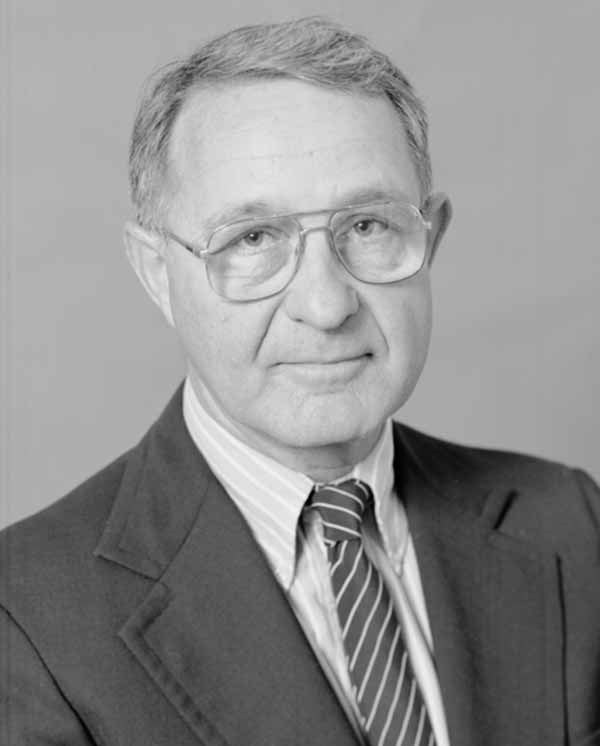J. Freeman Gilbert: Leading Scripps Oceanography Geophysicist
Scientist pioneered modern computation methods for seismology
Published Date
By:
- Mario Aguilera
Share This:
Article Content

J. Freeman Gilbert Credit: Scripps Institution of Oceanography Archives, UC San Diego Library.
James Freeman Gilbert, a renowned professor emeritus of geophysics in the Cecil H. and Ida M. Green Institute of Geophysics and Planetary Physics (IGPP) at Scripps Institution of Oceanography, UC San Diego, died in Portland, Oregon, on Aug. 15, 2014, from injuries related to an auto accident. He was 83 years old.
A leading contributor in computational geophysics, seismology, earthquake sources, and geophysical inverse theory, Gilbert was the author of numerous research papers, book chapters, reviews, and other publications.
“Since the moment he arrived at Scripps in 1961 after being recruited by Walter Munk, Freeman Gilbert was recognized as a true pioneer in Earth studies, armed with his knowledge and drive in applying modern computational tools to seismic problems,” said Margaret Leinen, director of Scripps. “Scripps is extremely grateful for all of Freeman’s contributions to science and to the education and training initiatives that he shaped at Scripps and the young UC San Diego campus.”
Gilbert was a leading expert in seismic research. With his Scripps colleague George Backus in the 1960s, Gilbert pioneered a method of inverting data for problems such as Earth structure, a theory that changed the course of modern geophysical sciences and that is used throughout all physical sciences.
He was instrumental in establishing modern seismograph networks, most notably the International Deployment of Accelerometers (IDA), a network built with the backing of his friend Cecil Green, co-founder of Texas Instruments, that has transformed modern earthquake studies as well as areas such as nuclear test-ban treaty monitoring.
“Freeman is remembered as a mentor and friend to countless seismologists around the world. He will be sorely missed,” noted former IGPP Director John Orcutt and current IGPP Director Guy Masters.
Born in Vincennes, IN, in August 1931, he attended the Massachusetts Institute of Technology (MIT) and received a B.S. in 1953 and a Ph.D. in geophysics in 1956. While at MIT he was a National Science Foundation Postdoctoral Fellow and a research associate (1956-57). He was an assistant professor of geophysics at the University of California, Los Angeles, in 1957-59, followed by two years as a senior research geophysicist at Geophysical Service Inc. in Dallas, TX. After joining Scripps, he held two Guggenheim Fellowships, in 1964-65 and in 1972-73.
Gilbert was the second director of IGPP from 1976 to 1988, following in the steps of founding director Walter Munk. Together, they established IGPP as a leading geophysical institute in the world—a role it continues to occupy to this day.
In 1972, he was elected to the National Academy of Sciences and in 1981 he was awarded the Royal Astronomical Society’s Gold Medal. He was the 1985 recipient of the Council of the Geological Society of America’s Arthur L. Day Medal for outstanding contributions to geologic knowledge and in 1990, he won the Balzan Prize from the Fondazione Internazionale Premio E. Balzan in Milan, Italy. In 1994, he was awarded the Doctor Honoris Causa at Utrecht University and, in the same year, was named Foreign Associate of the Accademia Nazionale dei Lincei in Rome. In 1999 the American Geophysical Union (AGU) awarded Gilbert the William Bowie Medal, the organization’s highest honor that recognizes outstanding contributions to fundamental geophysics and for unselfish cooperation in research.
“In the mid-1960s at IGPP, Freeman Gilbert and George Backus collaborated on a series of papers in an area that was to become known as geophysical inverse theory,” noted his William Bowie Meal award citation. “Clearly, Freeman and George are the fathers of this field and the research they did at this time changed the course of the geophysical sciences, broadly defined, forever.”
Gilbert received the 2004 Medal of the Seismological Society of America for outstanding contributions in seismology and earthquake engineering. Also in 2004, he received an honorary doctor of engineering degree from the Colorado School of Mines.
He served on several boards and committees, including the National Research Council and National Academy of Sciences’ Board on Earth Sciences and Resources, the IGPP external advisory committee, and the UC Santa Cruz Institute of Tectonics’ external advisory committee.
He was a senior fellow of the San Diego Supercomputer Center, an honorary foreign fellow of the European Union of Geosciences, and a fellow of the Geological Society of America, the American Academy of Arts and Sciences, AGU, and the Explorers Club.
He is survived by Sally Gilbert, his wife of 55 years; his children, Cynthia, Sarah, and James; sons-in-law Henry and Francisco, daughter-in-law Jennifer; and grandchildren Dominic, Elena, Stuart, and Tash.
Colleagues wishing to express condolences are invited to submit messages for web posting to scripps.ucsd.edu/news.
Arrangements for memorial services will be forthcoming.
Share This:
You May Also Like
Stay in the Know
Keep up with all the latest from UC San Diego. Subscribe to the newsletter today.



